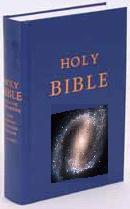Wednesday, September 20, 2006
Sacred Knowledge

Now as a comparison to Michael Shermer's pale pass at theology, consider these three articles in The Lutheran by scientists and educators who are also believers:
"'God allows the universe to create itself -- and evolve" by Mark Hollabaugh
"ID remains a legitimate gray area between random evolution and God" by Allen R. Utke
"Religion and science are both about knowing and wondering" by Patrick Russell
As an astronomer, everywhere I look in the universe -- from the largest galaxy to the smallest organism -- I see evolution. As a Lutheran Christian, I also confess that God created me and all that exists. For me, there is no conflict.
Some of my students have told me that God put fossils in rocks to test our faith. But this is a meager and ineffective test.
A much bigger test of my faith was when my 1-week-old godson, Tanner, was rushed to the emergency room because he stopped breathing. ...
When I confess in the words of Luther’s Small Catechism "I believe that God has created me and all that exists," I’m making a statement of faith about our God who exists outside of time and space.
I rather like the idea of a God who allows the universe to come into being, create itself and everything in it -- and evolve. Moreover, God has given us the intellect and curiosity to figure out how the universe does this. ...My godson recovered. When I held Tanner at his baptism and looked into his tiny face, I welcomed him into our incredible evolving universe.
As our pastor poured the water over his head, I marveled even more at the unconditional love of God given to us in Christ Jesus. That love and grace -- not the scientific inaccuracy of biblical texts -- are what really matter in our lives.
The ... most important reason for taking ID seriously hinges on my belief that without a dramatic infusion of spirituality, responsibility and stewardship in society, the 21st century carries the perilous potential of significant societal decline and even global environmental collapse -- possibly before 2050.
But how can that infusion be accomplished? Can it happen without an increased reverence for life and nature? If not, why is it preferable to say that evolution is a natural, random process in a purposeless, random universe rather than that it is an intelligently designed process in a purposive cosmos?
If holiness is replaced by hollowness in reality, what does an individual and society gain? Lose? Until convinced otherwise, I will continue to interpret Exodus 3:5 literally: "The place on which you stand is sacred ground."
But there is another argument often missed in recent discussions. As [Hollabaugh] points out, Isaac Newton’s laws have been replaced with a more accurate theory of gravity. Why don’t we teach its successor, General Relativity, to high-school students? And for that matter, why not teach the many genuine, fascinating controversies that science does raise?
Simple: Most high school students aren’t yet equipped to understand the theoretical complexities and make their own judgment. This will come with graduate education and experience. Asking students to assess the validity of the major theories of science, Einsteinian relativity or Darwinian evolution, is simply inappropriate at the high-school level. Not only is ID bad science, it is also bad education.
[W]e Lutherans can offer a healthier witness that proclaims the timeless revealed truths of our faith while taking seriously, and even embracing in a holy dialogue, the modern scientific picture.
We can trust the biblical account "In the beginning, when God created the heavens and the earth ..." (Genesis 1:1) without demanding it supply the natural mechanism. When God said, "Let the earth bring forth living creatures of every kind ..." (Genesis 1:24) we may safely gaze through the lens of evolutionary history to see just how fruitfully it did.



